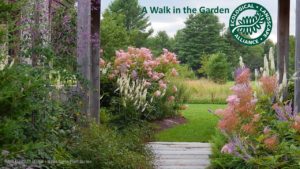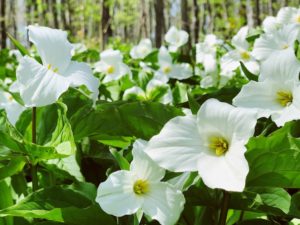 To find a list of current webinars, please go to: https://www.ecolandscaping.org/events/
To find a list of current webinars, please go to: https://www.ecolandscaping.org/events/
In February 2021, ELA was pleased to announce a second season of free online garden presentations, as people across the country and around the world continude to navigate the challenges of COVID-driven restrictions. We invited you to join us for Wednesday Walks in the Garden being presented on Wednesdays at 12:00pm EST, beginning on March 31st. The series will included twelve webinars covering a wide range of gardening topics to offer plant tips, gardening guidance, humor, and inspiration.
 Presentations are free but registration for each presentation is required. These free Wednesday webinars will offer virtual walks through gardens, parks, and green spaces and will be presented by experts sharing their knowledge and gardening wisdom.
Presentations are free but registration for each presentation is required. These free Wednesday webinars will offer virtual walks through gardens, parks, and green spaces and will be presented by experts sharing their knowledge and gardening wisdom.
Please Note:
Most (but not all) of the presentations in this series will be recorded and links to recordings will be available for all registrants after the live presentations; the recordings will also be archived. Review presentation descriptions for details.
Archived Walk in the Garden and Focus on Sustainability webinars are available to ELA members. If you are a member, click here to access Archived Webinars.
Not yet a member? Click here to learn more about ELA membership.
Wednesday Walks in the Garden
2021 Presentation Schedule
- March 31
Foliage & Focal Points: Ideas for Budgets and Gardens of All Sizes
In this presentation, Karen Chapman will explain the importance of establishing focal points, a key component of good garden design, and analyze three areas where they play an important role. And will discuss how to frame and enhance focal points with interesting foliage to create memorable vignettes.
At the speaker’s request, this presentation will not be recorded.
Click here for more information and to register. - April 7
Proper Planting Practices: Are We Landscaping in a Deficit Model?
In this presentation, Richard McCoy will provide information on current techniques of proper planting, how to correct unseen issues that are borne in the landscape nursery, the importance of the plant root collar, plant placement by matching site conditions to a plant’s cultural needs, and how these efforts add value to a landscape. Click here for more information and to register. - April 14
Maximizing Space in the Garden: Creating More of a Good Thing
No matter if you’re gardening in a close-knit neighborhood or a sprawling estate, you want to garden efficiently, prolifically, sustainably, and beautifully. Tovah Martin will explain that you need to garden smartly and you’ve got to conserve your resources. When you layer a garden, not only do you maximize space, but you can also create hardworking habitats.
At the speaker’s request, this presentation will not be recorded.
Click here for more information and to register. - April 21
Creating Community with Our Insect Neighbors
Join Dr. Nancy Lee Adamson to learn about common insects in our communities and how to support them. Nancy will highlight the difference between solitary and social wasps and bees, “beneficial” insects in agriculture, and ways we can support insects in our neighborhoods and broader communities.
Click here for more information and to register. - April 28
Going Underground: Unearthing the Role of Soil Organisms in Plant Health
There are an estimated nonillion (1030) microbes on the planet and these organisms play a critical role in plant health. This presentation will take you belowground to explore the microorganisms beneath our feet and the role they play in the nutrient cycles critical to plant growth and ecosystem sustainability. How global change is altering the Earth’s microbiome will also be discussed.
Click here for more information and to register. - May 5
Beauty and Biodiversity at Cornell’s Mundy Wildflower Garden
Please join Krissy Boys for a comprehensive virtual field trip of four discreet sustainable landscapes within the Mundy Wildflower Garden at the Cornell Botanic Gardens. This virtual field trip includes: the specialist bee pollinator garden; the flood plain forest; the deer exclosure; the native lawn; and the stream bank restoration.
Click here for more information and to register. - May 12
The Journey of Edible Landscapes
Edible landscaping is the use of food-producing plants in the residential landscape. It can combine fruit and nut trees, berrying shrubs, vegetables, herbs, edible flowers, along with ornamental plants into aesthetically pleasing designs. These designs can adopt any garden style and may include anywhere from 1 to 100 percent edible specimens.
Click here for more information and to register. - May 19
Designing Naturalistic Landscapes & Water Features
In this presentation, award-winning Canadian landscape designer, Randy Tumber, will share some of the tips, experiences, and philosophies that he has learned throughout his design career.
Click here for more information and to register. - May 26
Growing Vertically with Edible and Ornamental Plants
Vertical garden systems offer a number of benefits, such as increased accessibility for people with restricted physical abilities, privacy, and vibrancy. Join Irene Barber to learn about budget conscious options, plant and soil materials, and creative vertical garden designs.
Click here for more information and to register. - June 2
Rain Garden Primer: A Good Option for Your Landscape?
Join us to explore rain gardens. In this webinar, Amanda Sloan describes what rain gardens are, explains the elements that go into a successful rain garden project, and will help you decide if a rain garden is a good option for your landscape.
Click here for more information and to register. - June 9
Native Plants for Bird Friendly Communities
Join Audubon CT-NY’s Jillian Bell for a presentation focused on bird-friendly plants for your home landscape. With the right plants, any space—from a small container on your patio to an acre of your backyard—can become more bird-friendly.
Click here for more information and to register. - June 16
Fundamentals of Garden Layers
When designing any garden, there is an opportunity to eschew the norms of beauty as the only priority. With careful planning, we can create a space that works in harmony with nature, expands biodiversity, builds healthy soil, and nurtures pollinators and other wildlife.
Click here for more information and to register.

